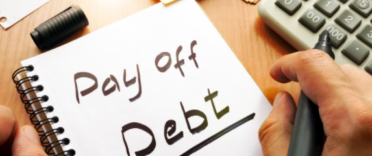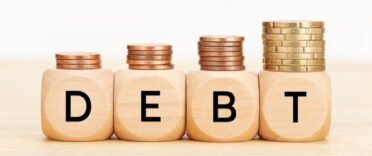Credit cards can be a great spending tool, but they can also be a stressful and expensive way to borrow money. Credit card debt can grow quickly if you do not repay your balance in full at the end of the month. What you owe will grow with interest, plus any late fees due to your provider. It is important to make sure you know how to clear your borrowing quickly to keep on top of your debt. In this article we cover the four immediate steps you can take to get yourself out of debt.
As well as reading our article, you can also watch Damien Fahy explain the best ways to clear credit card debt in this episode of Millennial Money.
How to clear credit card debt
Tip 1 – Always pay more than the minimum
Only paying the minimum on your credit card each month could mean you are paying your credit card off for a number of years. Paying more than the minimum can drastically reduce the length of time spent paying off your credit card.
For example, imagine you have £6,400 of credit card debt with an average interest rate of 17.43%. If you only pay the minimum repayment each month (starting at £150 per month, then reducing to £149 the following month and so on) it would take you a whopping 33 years and 4 months to clear your credit card.
However, if you fix the monthly repayment amount at £150 – assuming you can comfortably afford this each month – you will clear the balance in 5 years and 4 months. This will save you over £5,000 in interest.
Tip 2 – Prioritise debt
Many people will have debt spread across multiple credit cards. This means that to repay those cards quickly, it is important to organise your debt in order of priority. The credit card balance with the highest interest rate should be at the top of the list and the lowest interest rate at the bottom.
From there you can make sure the money you have for your repayments is being spent in the most efficient way.
Try to:
- Make a list of the debts in order of priority
- Work out your monthly budget for paying off the debt
- Set up minimum payment direct debits for the lowest priority cards
- Set up a direct debit to pay the most off on the highest interest rate cards (within budget)
Once you have cleared the highest debt, you can then apply that amount to the next credit card on the list. As you work your way down the list it creates this snowballing effect. You will be tackling all of your debts at once and paying less interest at the same time. Make sure that you set up a direct debit for each to ensure you do not miss any payments, as that could impact your credit score.
You could also think about prioritising clearing your debt over saving for the future. Savings while you are paying interest on your credit card debt is effectively paying to save. The amount you pay in interest on your credit card is likely to exceed the interest you get on your savings, so using that money to instead pay off your card can help to clear your debt sooner.
Tip 3 – Budget
Looking at how you spend your money each month is a great way to get some insight into where your money goes. Categorising your spending opens your eyes to the purchases that you may need to cut back on and helps you to effectively tackle any debt you may have. You can budget by going through your statements and categorising your spending in a spreadsheet, or by using a budgeting app.
We cover the best budgeting apps in our article 'The best budgeting apps in the UK: How to budget without trying'. You can also check out our article 'How to manage your finances and what you should focus on first'.
Remember: If you can't quantify it you can't control it.
Tip 4 – Do a balance transfer
A final tip is to transfer your credit card balance. A lot of people don't realise that you can transfer your current credit card balance (or balances) to another credit card with 0% interest. This allows you to avoid paying all of the high-interest fees for a period of time whilst you try to clear the debt.
For more information see our article: 'How to do a credit card balance transfer in 5 minutes' or check out our video 'How to clear debt with a 0% balance transfer'.
Once you have prioritised your debt, you can look for the best rate for your outstanding balance or balances. Research the best 0% deals, best long-term deals and talk to your credit card provider to find the interest rate possible.
Switching your debt to a lower rate will mean more of your monthly payments will go towards clearing the capital you owe and not be eaten up by interest charges, which means you will reduce the time it takes to clear the credit card debt. Remember to always either clear or transfer your debt when a 0% deal ends. This is because the rate on balance transfer cards after the introductory offer ends can often be very high.
Check out our article 'Best 0% balance transfer credit card deals' to compare the best deals.
Keep in mind that this method of clearing credit card debt does involve taking out an additional line of credit. For some people, this may lead to more spending and more debt. If you are on the fence, read our article ‘Should I get a credit card?’.
How to get help managing your debt
For some people, the best way to manage credit card debt is to get expert help. In the UK, there are a whole host of great organisations that can connect you with experts and advocates who can walk you through the steps you need to take to get to grips with your finances. Read our article ‘Where to get free debt advice’ to learn more.
If you have any particular burning questions or topics that you would like us to discuss, email [email protected].
Head over to our social media accounts too:
Facebook - Money to the Masses
Twitter - @money2themasses
Instagram - @moneytothemasses
Youtube - Money to the Masses
If a link has an * beside it this means that it is an affiliated link. If you go via the link Money to the Masses may receive a small fee which helps keep Money to the Masses free to use. But as you can clearly see this has in no way influenced this independent and balanced review of the product.







